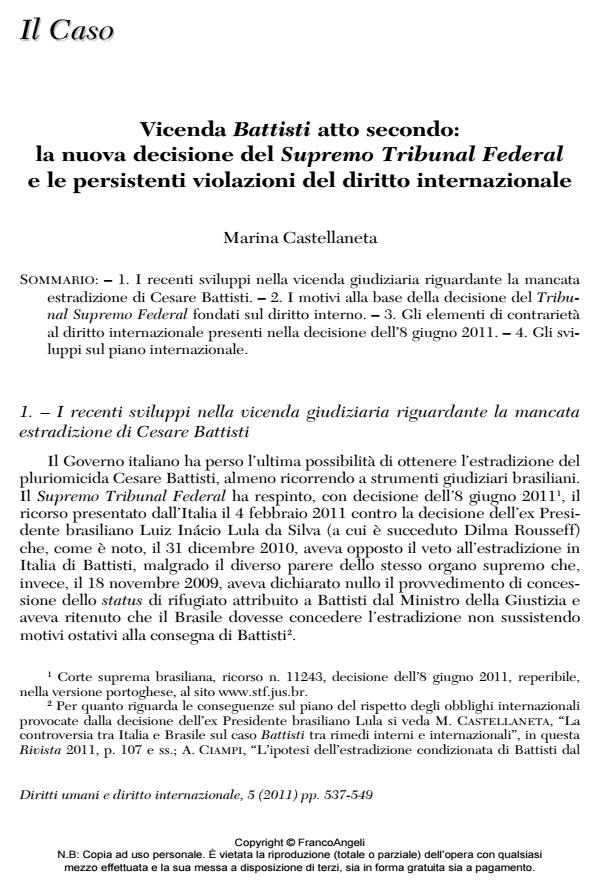Battisti affair second act: the new decision of the Supremo Tribunal Federal and the persistent violations of international law
Journal title DIRITTI UMANI E DIRITTO INTERNAZIONALE
Author/s Marina Castellaneta
Publishing Year 2011 Issue 2011/3
Language Italian Pages 13 P. 537-549 File size 169 KB
DOI 10.3280/DUDI2011-003004
DOI is like a bar code for intellectual property: to have more infomation
click here
Below, you can see the article first page
If you want to buy this article in PDF format, you can do it, following the instructions to buy download credits

FrancoAngeli is member of Publishers International Linking Association, Inc (PILA), a not-for-profit association which run the CrossRef service enabling links to and from online scholarly content.
The Brazilian Supreme Court decision of 8 June 2011, which dismissed the Italian application against the decision of the former Brazilian President Luiz Inacio Lula da Silva, who had denied the extradition of Cesare Battisti in Italy, is of particular interest not only because it shows an internal contrast between political and judicial system, but mainly because it contains some statements contrary to international law. In particular, the decision, describing the act as a political act of Lula expression of state sovereignty and therefore unquestionable in domestic court, has allowed Brazil to escape to comply with the treaty obligations made by the ratification of the Treaty on bilateral extradition of 17 October 1989, despite the numerous occasions it was claimed by internal tribunal that these acts are under jurisdictional control. The decision of Lula also makes frequent recourse to the conclusions reached by the Advocate General Albuquerque Faria who recalled the risk of human rights violations against Battisti. This statement has not, however, a factual finding as there is no evidence as to the risk of persecution of Battisti in Italy. As a result, Brazil has violated the customary rule of pacta sunt servanda failing to comply with the obligations contained in the 1989 Treaty. Italy, after the ‘defeat’ on the internal level, can now apply to the International Court of Justice although it will be unlikely to achieve the delivery of Battisti
Marina Castellaneta, Vicenda <i>Battisti</i> atto secondo: la nuova decisione del <i>Supremo Tribunal Federal</i> e le persistenti violazioni del diritto internazionale in "DIRITTI UMANI E DIRITTO INTERNAZIONALE" 3/2011, pp 537-549, DOI: 10.3280/DUDI2011-003004